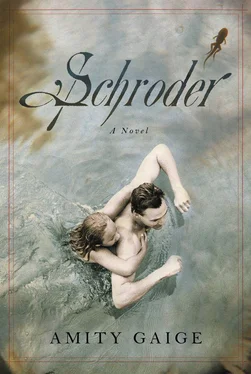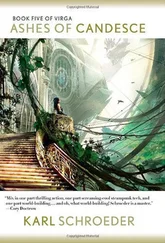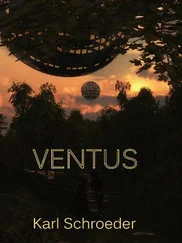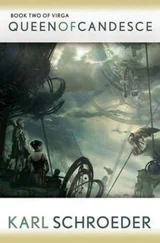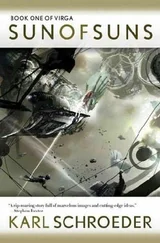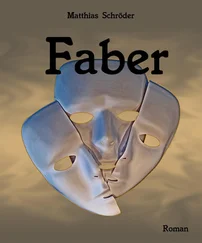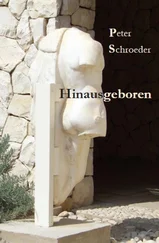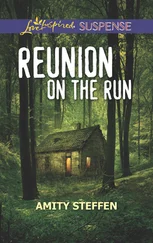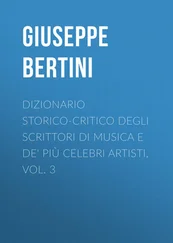And our getaway car! I looked out the window to where the thing sat in the mist. What sort of rube steals a car with a white racing stripe? The car was useless. We had driven it all over North Hero, and earlier, to Swanton. It was a moving trap, a fucking advertisement. The only place in which I knew we were invisible was right where we were, but we couldn’t stay here. I could see that Meadow had lost the fragile enthusiasm she’d first had for our trip. Hell, she’d been doing me a favor the whole time. I could see that.
But what did I want? Just a little more time. But for what? What spectacular thing was I going to do with it? I didn’t want to be exposed — how much I was about to lose — but I knew I was going to lose it, now or later. I grabbed a nearby chair back, squeezing until it hurt. There was something more to do. I wasn’t done .
“Meadow,” I said. “Look at me, please.”
Not changing her position, she looked at me.
“Why are you sad? Don’t you like your hair?”
Her hand flew to her head and brought a swath of it to her face. “Actually. I like it lots.”
“Well, maybe we should change it back. I hate to say it, but I kind of miss your real hair—”
“No. No, thank you.” She shook her head firmly. Her eyes moistened, but she refused tears. She seemed shy of me, as if she’d realized that her association with me was far less beneficial to her than she’d previously thought.
“So. What is it? What’s wrong?”
She shrugged. “I just don’t understand why we have to be friends with April.”
“Oh,” I said, relieved. “Well, we don’t have to be friends with April. April and I are ships in the night. April and I are — two articles of clothing that got accidentally tangled up in the dryer. April and I just had some comfort to give each other. I had some comfort to give her, and she had some comfort to give me. Do you know what I mean?”
“No. Why go to all the trouble? Why not just keep it and comfort yourself?”
“I do comfort myself,” I said, my voice thick with my own double meaning. “I comfort myself all too often. It’s not the same. Everyone wants to be comforted by someone else.”
“Why?”
“Why?” Frustrated, I grabbed the air with both hands. “Why? What’s wrong with you? Don’t you like to be held and kissed? Don’t you like to be babied sometimes by me or your mom, or by Mom-Mom or Pop-Pop or Stinky Blanket?”
I saw her memory snag on the words, and her eyes filled up instantaneously with tears.
“Oh, no,” I said, grabbing her hands. “Oh boy. I didn’t mean to—”
“I miss my mommy,” she said, tears falling onto the table-top. “I miss Mom-Mom and Pop-Pop. I don’t like this vacation anymore. I don’t care about Mount Washington. I don’t want to go there anymore. I don’t want to go there with you. You’re not good.” She looked at me with an expression of disapproval I’d never seen on her face before. “You’re not good! You told me you were going to be right back! That I wouldn’t be alone!”
“Oh, Meadow. Please—”
“And you were nowhere! You were away .”
She snapped her hands back from mine and swiped at her eyes. She stood up and walked out. The slam of the cabin door resounded through the cove.
I grabbed my wallet and keys and followed. She was already indistinct in the morning haze, marching toward the road. She was carrying, with some difficulty, the bucket with the frog in it.
“Hey,” I said, catching up to her. “Let me help you. Tell me the plan. Talk to me. What are we doing?”
She kept walking, her eyes red but dry. I peered into the bucket. The frog was floating spread-eagled in two inches of water. Meadow had covered the top of the pail with salvaged chicken wire to prevent his escape, but it looked to me like he was pretty much dead. I took hold of the handle, careful not to touch her hand. We entered the field we’d crossed with her on my shoulders days before. This time, we skirted the edge, passing the frugally darkened windows of our hostess’s farmhouse. We were soon on the main dirt road, walking uphill. Cows observed us from behind electrified wire. I was surprised at how fast Meadow could walk without stopping, and how far. After some outbuildings on the crest of the hill, the road began to dip again, and we could see, in a field below us, a small pond.
“Good,” said Meadow, as if she’d known it would be there. “That’s where we’ll put him. Then he can have the place to himself and he can start his own family.”
“Or maybe he’ll become a poet and write a book called Frogs Come and Gone .”
“No,” she said, eyes narrowing. “He hates poetry. All frogs do. Amphibians are allergic to poetry.” She took a couple of steps forward and then looked up at me, hard. “You can come. But only if you don’t touch him with dry hands. That’ll kill him.”
I fell to one knee. “Sweetheart,” I said. “If you want, when we get back to the cabin, we can pack up, and I’ll take you straight home. I’ll take you straight home to Mommy. I want you to be happy. I don’t want you to be angry at me. Say the word.”
She said nothing, but the expression in her eyes softened, and she finally wiped her brow with the arm of her oversized sweatshirt. She gave the bucket a yank.
“Come on,” she said, and we continued to the pond, over which the sun was now wearing through cloud cover.
THE TANGERINE AND THE FOX

Listen. I don’t see myself as some kind of Socrates, but from my point of view, it doesn’t seem fair to hold a child back from her natural curiosities. Some kids — kids like Meadow — like to ask the hard questions whether or not you’ve brushed up for them. Take the example of the tangerine. She saw a forgotten tangerine that had pruned and hardened in the fruit bowl back in Pine Hills, and she wanted to know what would happen to it next. Would the tangerine keep shrinking and finally disappear? We observed it. We noticed that approximately seven days after we first observed the process of hardening, a process of softening began.
“Decomposition,” I said. “The reverse of growing. But first the dead thing has to dry out. Like with rigor mortis.”
“Rigamordis?”
“Yeah. When a body dies, the body first becomes stiff, like”—and here I did a vampy imitation of a dead body, which made her laugh—“and eventually the same thing happens to the body that happened to the tangerine.”
“It gets stiff; then it gets mushy.”
“Yes,” I said. “Everything that dies eventually gets mushy.”
Her eyes grew wide. “Even we will?”
“Yes,” I said. “Even we will get mushy someday. Everything dies that is alive. It’s important to accept that up front. You do less running.”
Soon after, when we found the dead fox in the backyard, I tried to use the fox as an advanced example of the tangerine. We put it in an old milk crate and put it respectfully behind the lawn-mower shed. And we watched it, day to day, as the sun burned away its flesh and flies took it away in infinitesimal pieces and the wind blew away its form, until it was almost a carpet of copper fur, sinking back toward the earth. We spent hours watching the fox decompose. I know it sounds weird, but it didn’t feel weird at the time. In fact, I thought of the fox as something of a pedagogical success. Which is ironic, as vis-à-vis you, her mother, made tense by advanced stages of marital conflict, the fox was The Final Straw.
“I need to talk to you,” you said one morning, your eyes hard.
Читать дальше
